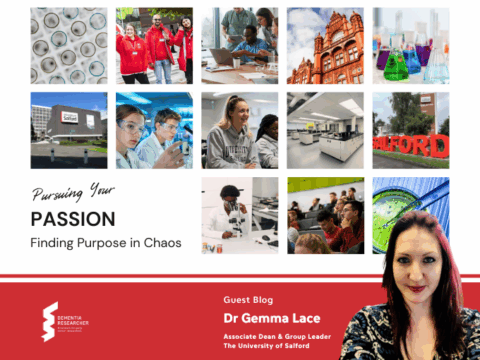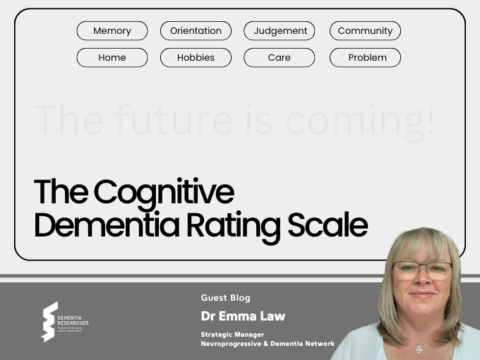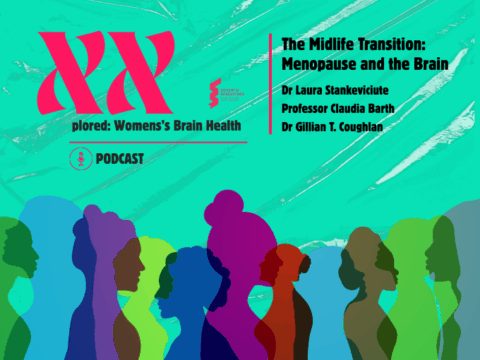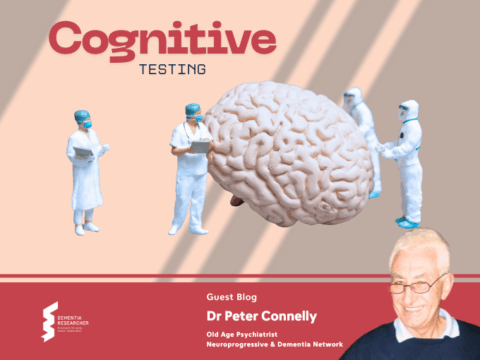With populations getting older, age-associated disorders, such as Alzheimer’s disease, are projected to place significant demands on global health systems over the coming years. There is therefore an increasing need to understand how to improve and preserve our brain health, but how can we do this when no consensus definition exists of what brain health actually is and what it looks like? In this blog I will discuss the challenge of trying to understand brain health, and why it is important.
If we want to promote good brain health, we need to be able to measure it so we can distinguish it from poor brain health. However, in order to measure brain health, we need to be able to first define it, or we risk it being a catch-all term that simultaneously represents everything and nothing.
An article published in the British Medical Journal in 2020 proposed that brain health could be defined as “the preservation of optimal brain integrity and mental and cognitive function at a given age in the absence of overt brain diseases that affect normal brain function”. What the authors were suggesting was that brain health could be thought of as our brains having no presence of disease and functioning to the best of its ability as we would expect according to one’s age. This is a disease-focussed viewpoint which would imply that if an individual was to have a brain disease, they would not be considered to have good brain health even if they were not experiencing cognitive impairment and were able to function well in their day-to-day life. This is a problem because with Alzheimer’s disease, for example, we know that pathological changes, where proteins clump together in the brain and disrupt cell function, progress for many years before any cognitive symptoms noticeably develop. At early stages of the disease there is, therefore, presence of disease but absence of functional impairment; Alzheimer’s disease without the dementia. Defining brain health as good cognitive function in the absence of brain disease would automatically mean that individuals in the early stages of Alzheimer’s disease would be considered to have poor brain health despite having little or no cognitive impairment. The presence of disease determines whether brain health is good or poor, which places more weight on disease than brain function. This is where the definition fails.
Other researchers have argued against the focus on brain disease when defining brain health, instead placing emphasis more broadly on social, mental, and emotional factors determining overall brain health. For example, in 2017, the Lancet Commission on dementia prevention, intervention, and care outlined nine potentially modifiable risk factors for dementia, including various non-disease related factors. Modifiable factors are those that we can act upon to reduce our risk and promote good brain health. The nine factors were: low level of education, hypertension, hearing impairment, smoking, obesity, depression, physical inactivity, diabetes, and low social contact. Last year, three more risk factors for dementia were added due to growing evidence. These factors are excessive alcohol consumption, traumatic brain injury, and air pollution, which now feed into an updated 12 risk factor life-course model of dementia prevention. These modifiable risk factors account for 40% of worldwide dementia cases which presents a huge opportunity for dementia risk reduction and overall promotion of good brain health. If risk can be detected early, this will maximise the opportunity for appropriate management which can have long-term health implications not just for individuals, but for public and global health as a whole.
If brain health is something we want to be able to measure, and subsequently integrate into healthcare advice, what tools are available to clinicians? If we are to consider brain health as encompassing more than specific aspects of cognitive function, then there is a lack of robust validated measures to either assess or quantify brain health that go beyond, for example, the screening tools used for cognitive impairment. An option which is currently being explored for early disease detection is brain scanning, but what exactly would good vs poor brain health look like, and if we are to define brain health as encompassing social, mental, and emotional aspects, would we see changes in brain scans that correlate with these factors?
In an attempt to bring together these different aspects of brain health into a single quantifiable measure, the concept of a “brain health score” has been explored with the aim of assessing an individual’s risk which could then be further used to assess whether improvements in brain health can be achieved. For example, a recent study looked at the relationship of a modifiable risk score for dementia, derived from the Lifestyle for Brain Health (LIBRA) index, with brain scans and cognitive tests. As the LIBRA index is based on modifiable risk factors which can be changed, the focus is placed on the potential to improve brain health. The researchers found that scores on the LIBRA index were associated with changes in brain scans and cognitive impairment, which suggests that with further validation it could be a useful tool for measuring brain health.
Brain health is increasingly becoming a focus of dementia charities and organisations as a way of reducing dementia risk. For example, Alzheimer’s Research UK have recently developed a public awareness and engagement campaign called “Think Brain Health” which describes brain health as encompassing the multiple aspects of brain function. The aim of this brain health initiative is to highlight the importance of good brain health, and how minimising potential risks to our brain health can in turn reduce the risk of developing dementia in later life. Brain Health Scotland is an organisation funded by the Scottish Government which is going one step further. They provide advice on brain health research, policy, and healthcare, and through the development of Brain Health Services, they will be able to provide patients with information and advice they need to improve their brain health.
There is still a long way to go before we fully understand the mechanisms which are responsible for particular brain functions, and what happens when these mechanisms no longer function as they should. Despite no universal agreement, some progress has been made in defining brain health, and understanding the risk factors which contribute to poor brain health and ultimately the brain diseases which lead to dementia. Improving education and clinical advice around maintaining good brain health will have a significant effect on minimising the risk of dementia in the future.

Dr Kamar Ameen-Al
Author
Dr Kamar Ameen-Ali is a Research Associate at University of Glasgow, exploring how neuroinflammation following traumatic brain injury contributes to the progression of neurodegenerative diseases that lead to dementia. Having first pursued a career as an NHS Psychologist, Kamar went back to University in Durham to look at rodent behavioural tasks to completed her PhD, and then worked as a regional Programme Manager for NC3Rs. Kamar brings a wealth of experience and writes on a range of topics from her time in the NHS, working for a Research Funder and from her work and life in the lab.

 Print This Post
Print This Post





Congratulations Dr Kamar for asking two very essential questions and for a great article. Huzzah!!
Brain health is important yet it can’t exist without its mate ‘general health’. They allow scientists and citizens to do the things they lov.e Both provide an opportunity to live a full and satisfying human life and the freedom to learn and grow on many levels as we age.
The brain health of our ageing population is important for so many good reasons yet overall, our health is not important to us as a society. Brain/general health is an aside, an afterthought. We aren’t taught to nurture our health as children, we aren’t surrounded by healthful role models and the environment we live in is full of toxins.
Our brain-health is a precious gift yet we ignore it for most of our lives and now so many are losing it and we have growing ageing population with poor health and brain disease pandemics.
Brain health is important to those who fear dementia. From a public perspective, we need clear, practical, valuable and reliable information from dementia scientists that helps us know what it is we need to do, to maintain our brain health as we age. That leads to this question:
Is brain health important to funders of dementia research? Because I don’t find many studies from the past, nor studies currently asking these very important, and very overdue, brain health-related questions:
a) What is brain health?
b) How do we maintain brain health?
c) What are all the factors involved in compromising brain health? Because we can’t sit back and accept we only know 40% of modifiable risks, we must keep going until we uncover the unknown 60%)
d) Has anyone tried to stop brain disease progression by focusing on growing brain health? It stands to reason that as a brain disease state grows, brain health is deteriorating in equal measure. So when the right health support is provided disease progression will slow and then stop while in equal measure, brain health growsback into balance, an optimised state for that stage of life.
The brain has regenerative abilities until a specific point of disease progression so,
e) Is it possible to regenerate brain health from a diseased brain state?
Heaven forbid we invite a new neural pathway to grow in our brain as we entertain such a ludicrous idea right?
Anyone for some brain health research?
How many presentations at the Alzheimer’s show in 2 weeks’ time in London, are about brain health research? ZERO.
So why this big black hole in our brain health knowledge? Why no grants from funders to lift ‘brain health’ to the fore on the global dementia research agenda stage?
To fully understand we must follow the money.
Where do funders focus their investments now that the privately controlled public partnership health model has gone viral and overrun our society’s already struggling immune system and compromised every gland?
Follow the money.
Bottom line, every industry, including ‘health’, has ‘make more money’ as primary focus. I’ll even go so far as to nudge early career dementia researchers into a trigger zone by saying that it looks to me like the dementia research community is full of sheep who acquiesce and passively comply with research agendas, or they don’t get funding. That is not science.
Scientists need to be free from corporate agendas so they can connect with their higher selves and follow their hearts, intuition and what interests them. I go speak to my supervisor, I want to study brain health. Umm.. sorry mate, you won’t get funding for that. But this question hasn’t been looked into and I can see some potential here.. Sorry mate, there’s no money for that.
Some will say, this is how the system is we must accept it so we can pay our rent and holiday and get a paper published and a Doctor title. No. This is not science. This is blackmail and the hijacking of true science.
I’ve been studying brain health independently for over 3 years. There is much I can share that is not common knowledge, because I’ve been free to follow my intuition and curiosity. Free to ask the questions that matter.
I know the focus of the dementia research community is on stopping disease progression, so why is everyone so brain fogged about the idea that doing this may be possible without the need for drugs or gene therapy? Brain disease progression can be stopped when we focus on brain health restoration.
Wrt the BMJ Brain Health definition, they really should have stopped with this: ”the preservation of optimal brain integrity.”
We also know that acute and chronic mental and cognitive issues occur due to stress or trauma yet brain health can still recover.
From my studies it is evident that the invisible onslaught of over 80 000 chemicals, toxins, heavy metals and plastic molecules now in our air, water and on our fresh food, along with chronic high blood fat, pathogen load, accumulating systemic toxic load, lack of nutrients, stress and dehydration make up the other 60% of the modifiable risk equation.
But let’s keep it hush-hush because you know, our economy which has been deteriorating since the 80’s relies heavily on the oil, plastic, agrifood, pharma, chemical, medical industries, and you know, they all have shares in each other and poor health is big business!
And these are ultimately the companies that fund research so no one funds research to understand brain health because they know full well what they are doing to compromise our brains and health.
What we really need is for the Government to crack down on chemical, pharma, oil, gas, and plastic production and pollution and stop using our tax money to subsidise the massive toxic chemical-laden fruit and vegetable industry and instead support organic farmers. But they’re in it together so…
What hope is there for brain health within such a corrupt system?
Sincerely,
Lar Fermor
Brain Health Creation Coach
Great post — I really enjoyed the way you presented this. It’s clear, thoughtful, and easy to engage with, which makes it stand out. It’s always inspiring to come across work like this!